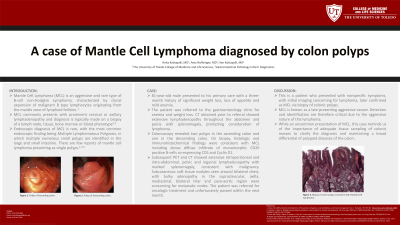Monday Poster Session
Category: Colon
P1707 - A Case of Mantle Cell Lymphoma Diagnosed by Colonic Polyps
Monday, October 23, 2023
10:30 AM - 4:15 PM PT
Location: Exhibit Hall

- AK
Anita Kottapalli, MD
University of Toledo
Toledo, Ohio
Presenting Author(s)
Anita Kottapalli, MD1, Amy Noffsinger, MD2
1University of Toledo, Toledo, OH; 2Inform Diagnostics, Irving, TX
Introduction: Mantle Cell Lymphoma (MCL) is an aggressive and rare type of B-cell non-Hodgkin Lymphoma characterized by clonal expansion of malignant B type lymphocytes originating from the mantle zone of lymphoid follicles. It has a variety of presentations, although the spleen and bone marrow are most frequently affected while gastrointestinal involvement is less common. Endoscopic diagnosis of MCL is rare, and the most common endoscopic finding in gastrointestinal MCL is Multiple Lymphomatous Polyposis. There are few reports of mantle cell lymphoma presenting as a single polyp with or without symptoms. The following case illustrates an uncommon case of Mantle Cell Lymphoma diagnosed primarily by colonic polyps.
Case Description/Methods: An 81-year-old male presented to his primary care with a three month history of significant weight loss of twenty pounds, loss of appetite, and a severe episode of nausea and vomiting. He was found to have mild anemia. Hemoccult was negative. The patient was referred to the gastroenterology clinic for anemia and weight loss. He denied abdominal pain, nausea, vomiting, diarrhea or constipation, blood or mucus in stool and family history of colon polyps or cancer. CT showed extensive lymphadenopathy throughout the abdomen and pelvis with splenomegaly. Consideration of lymphoma was recommended at this time. Colonoscopy was done and revealed two polyps in the ascending and sigmoid colon. Biopsy revealed mantle cell lymphoma. Subsequent PET and CT findings were consistent with malignancy and showed extensive retroperitoneal and intra-abdominal, pelvic and inguinal lymphadenopathy and marked splenomegaly. Subcutaneous soft tissue nodules seen around bilateral chest, with bulky adenopathy in the supraclavicular, axilla, mediastinal, bilateral hilar and para-aortic region were concerning for metastatic nodes. The patient was referred for oncologic treatment and died within the next month.
Discussion: This is a patient who presented with nonspecific symptoms, with initial imaging concerning for lymphoma which was later confirmed as MCL via biopsy of colonic polyps. MCL is known as a late‐presenting aggressive cancer. Detection and identification are therefore critical due to the aggressive nature of this lymphoma. While an uncommon presentation of MCL, this case reminds us of the importance of adequate tissue sampling of colonic masses to clarify the diagnosis and to maintain a broad differential of polypoid diseases of the colon.
Disclosures:
Anita Kottapalli, MD1, Amy Noffsinger, MD2. P1707 - A Case of Mantle Cell Lymphoma Diagnosed by Colonic Polyps, ACG 2023 Annual Scientific Meeting Abstracts. Vancouver, BC, Canada: American College of Gastroenterology.
1University of Toledo, Toledo, OH; 2Inform Diagnostics, Irving, TX
Introduction: Mantle Cell Lymphoma (MCL) is an aggressive and rare type of B-cell non-Hodgkin Lymphoma characterized by clonal expansion of malignant B type lymphocytes originating from the mantle zone of lymphoid follicles. It has a variety of presentations, although the spleen and bone marrow are most frequently affected while gastrointestinal involvement is less common. Endoscopic diagnosis of MCL is rare, and the most common endoscopic finding in gastrointestinal MCL is Multiple Lymphomatous Polyposis. There are few reports of mantle cell lymphoma presenting as a single polyp with or without symptoms. The following case illustrates an uncommon case of Mantle Cell Lymphoma diagnosed primarily by colonic polyps.
Case Description/Methods: An 81-year-old male presented to his primary care with a three month history of significant weight loss of twenty pounds, loss of appetite, and a severe episode of nausea and vomiting. He was found to have mild anemia. Hemoccult was negative. The patient was referred to the gastroenterology clinic for anemia and weight loss. He denied abdominal pain, nausea, vomiting, diarrhea or constipation, blood or mucus in stool and family history of colon polyps or cancer. CT showed extensive lymphadenopathy throughout the abdomen and pelvis with splenomegaly. Consideration of lymphoma was recommended at this time. Colonoscopy was done and revealed two polyps in the ascending and sigmoid colon. Biopsy revealed mantle cell lymphoma. Subsequent PET and CT findings were consistent with malignancy and showed extensive retroperitoneal and intra-abdominal, pelvic and inguinal lymphadenopathy and marked splenomegaly. Subcutaneous soft tissue nodules seen around bilateral chest, with bulky adenopathy in the supraclavicular, axilla, mediastinal, bilateral hilar and para-aortic region were concerning for metastatic nodes. The patient was referred for oncologic treatment and died within the next month.
Discussion: This is a patient who presented with nonspecific symptoms, with initial imaging concerning for lymphoma which was later confirmed as MCL via biopsy of colonic polyps. MCL is known as a late‐presenting aggressive cancer. Detection and identification are therefore critical due to the aggressive nature of this lymphoma. While an uncommon presentation of MCL, this case reminds us of the importance of adequate tissue sampling of colonic masses to clarify the diagnosis and to maintain a broad differential of polypoid diseases of the colon.
Disclosures:
Anita Kottapalli indicated no relevant financial relationships.
Amy Noffsinger indicated no relevant financial relationships.
Anita Kottapalli, MD1, Amy Noffsinger, MD2. P1707 - A Case of Mantle Cell Lymphoma Diagnosed by Colonic Polyps, ACG 2023 Annual Scientific Meeting Abstracts. Vancouver, BC, Canada: American College of Gastroenterology.
